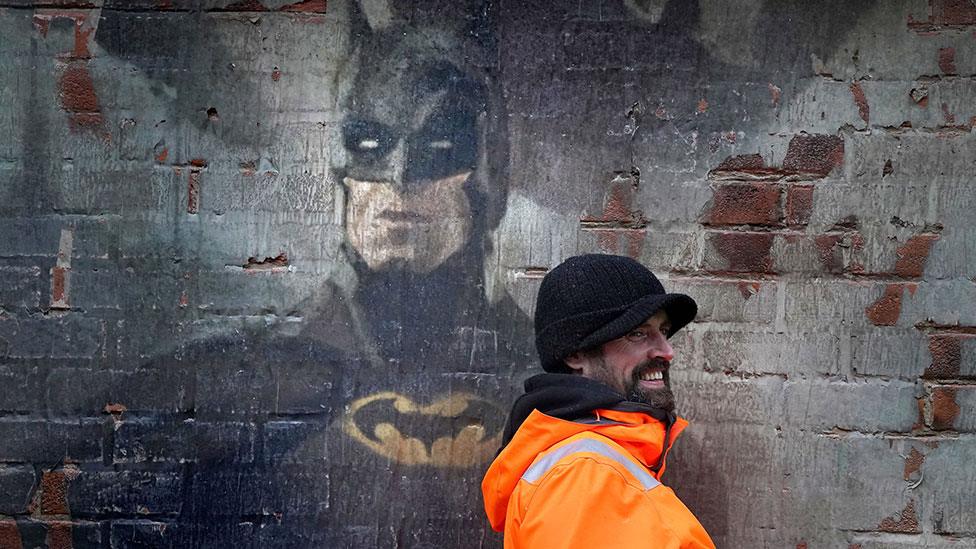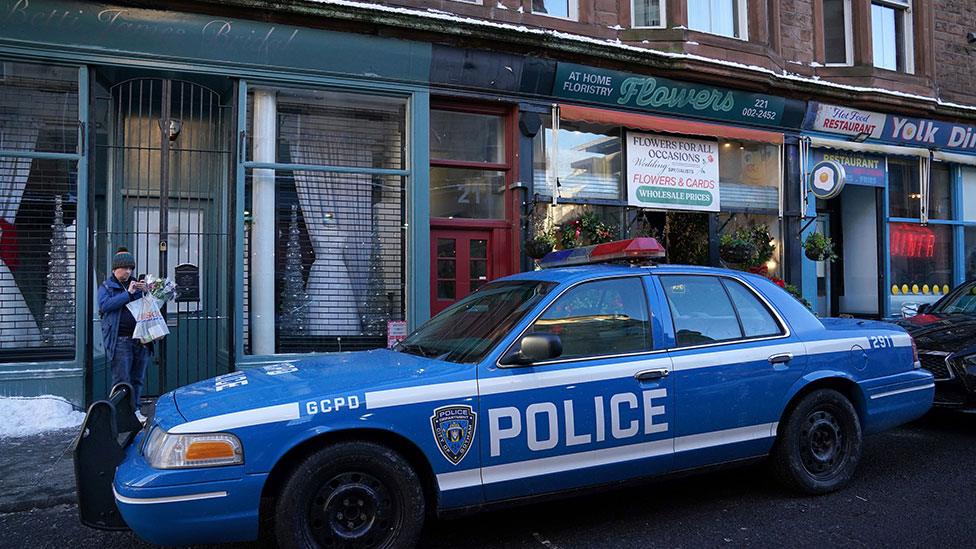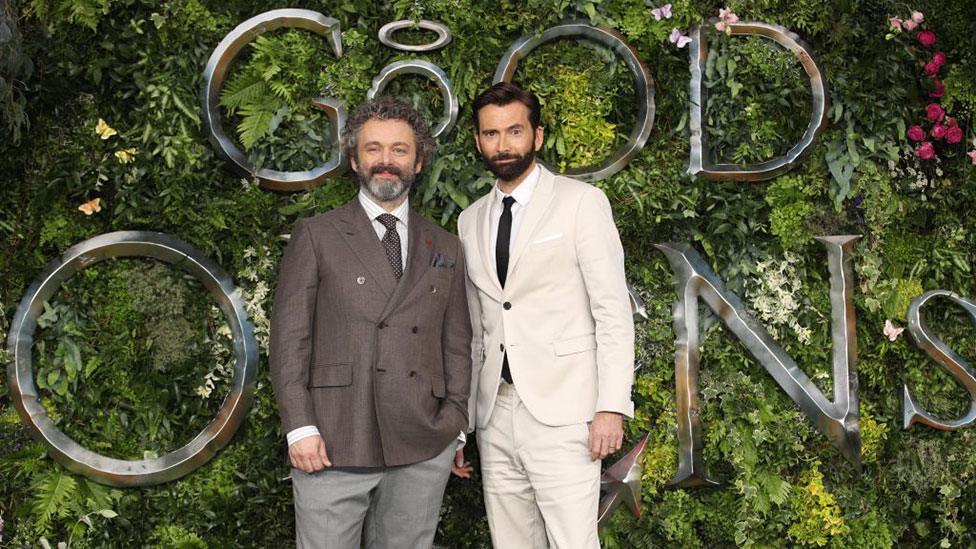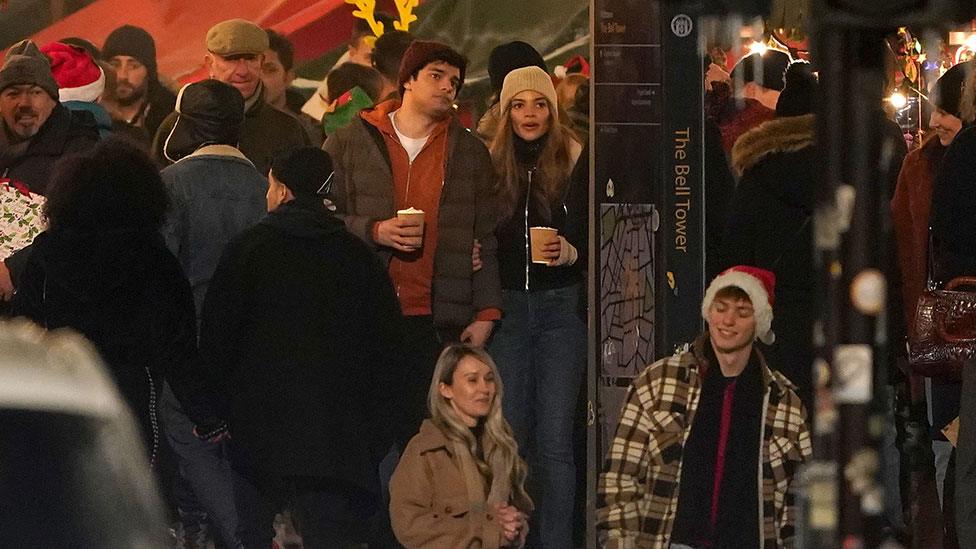Does Scotland benefit when Hollywood comes to town?
- Published

Part of Glasgow were turned into Gotham City for the filming of a new HBO series
It's hard to miss the fact that Glasgow is doubling for Gotham at the moment.
There's barely a corner of the city which hasn't been transformed, the street signs and vintage cars and huddles of well wrapped crew reminding us that Hollywood has once again rolled into town.
Batgirl is the latest Warner Brothers movie for its HBO Max streaming platform. The production has been filming in Glasgow since the end of last year, and will continue for the next two months.
"It's a huge deal for the city," says Councillor Ruairi Kelly, who chairs Glasgow City Council's neighbourhoods, housing and public realm committee.
"We've had some major productions here but this is the first time a whole film has been based in the city, from start till finish."
Earlier in the week Glasgow Film Office, set up by the council in 1997 to attract film and television to the city, declared 2021 a record year.
Films like The Flash and Indiana Jones, along with TV productions like Annika, Shetland and Screw had, they said, contributed a record £42.2m to the local economy.
Where does the money go?
"It's hard to say exactly," says Councillor Kelly.
"There's a lot of commercially sensitive information but it's things like vehicle rental, catering, even extras, it all benefits the wider economy of the city."
But a number of industry professionals question the figure, and would like a better breakdown of the numbers.

Vintage cars and US-style shop fronts have been spotted in parts of the city
Grant McPhee is a Scottish film director and camera operator and has worked on many of the productions which have been made in Scotland over the last few years.
"Any film work taking place in Scotland is positive news," he says
"But we have to be open and proportional with what the real-world benefits to Scotland and the Scottish film industry are," he says.
Film and TV producer Chris Young agrees.
"It's a tale of two worlds. It is a fantastic moment, there are lots of productions and it's never been busier but that's high end productions coming to Scotland, taking advantage of the tax breaks.
"In terms of indigenous production, there's nowhere near that support. They have a lower tariff.
"It's fine to boast about having Amazon and Netflix in our back yard but if they got a better tax credit in France or Mexico, they'd go there. We have amazing landscape, brilliant, technicians , writers, actors but we're not really nurturing the next generation.
"What's required is a national film studio, a national film school and a joined up strategy."

Good Omens, starring Michael Sheen and David Tennant, is filming in Scotland
Isabel Davis, executive director of Screen Scotland, the national agency set up in 2017 agrees.
"That's what we were brought into being to create," she says. "And a lot of work is happening from school age onwards.
"And Chris Young is right. The best way to learn is on productions and that's where we are working.
"Take someone like Douglas MacKinnon, who is showrunner for Good Omens and Anansi Boys, both filming in Scotland at the moment. He is working to bring trainees on to both those productions and that's key to what we're trying to achieve."
Scottish talent
It's a point echoed by Culture Secretary Angus Robertson.
"We're working to build a more sustainable screen industry and this does not have to mean a trade-off between international and Scottish-based companies or between film and TV."
"Most of the productions filming here, and all those that are funded by Screen Scotland, have to build training into their productions and we are making skills and talent development a priority.
"We see inward investment, which accounts for only a 10th of Screen Scotland's budget, going hand-in-hand with strengthening and developing Scottish-based crews and creative talent."

Actress Leslie Grace was in Glasgow for the Batgirl shoot
But that comes back to the point that many industry professionals here make. These big Hollywood productions don't seem to be hiring many local crews.
Batgirl received £150,000 from Glasgow City Council as an incentive to film here. Isabel Davis says she's unable to comment on the specifics she says any production given public money is expected to hire locally.
She says that's "people predominately from Scotland, some are from the south, but most are based in Scotland".
"It's far better to crew locally and we've seen a huge increase in demand," she said.
That's a point which many in the local industry dispute. Grant McPhee says you only have to look at the unit lists and IMDb to see the disproportionate numbers of London based crews.
"We need to have serious discussions to ensure locally-based crew are prioritised for these visiting large scale productions, something which is currently not the case despite promises made."
"It is not enough to simply pay for entry level positions with a glass ceiling. Scotland is full of experienced actors, technicians and above line talent and in order to create a sustainable infrastructure with real benefits to the future of Scotland's film industry they must not be side-lined for crew based outside of Scotland."
Meanwhile the Batgirl production has rolled on to a different part of the city and Councillor Kelly is confident it'll leave a legacy of more than just photographs and memories of the days in which Glasgow became Gotham.
"It's not just a case of the circus coming to town and leaving afterwards. We want long term careers built here and with the new studio at Kelvin Hall opening, we can build on that. We'll be looking to work with production companies to secure apprenticeships, skilled work and all the community benefits we can push for."